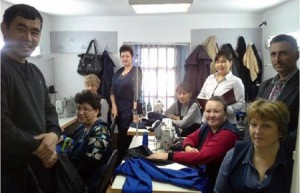 ALMATY REGION – Kazakhstan President Nursultan Nazarbayev called entrepreneurship the main instrument of industrial and social modernization of Kazakhstan and a solid economic foundation for the Society of Universal Labour in his Jan. 17 state of the nation address. The President noted that international ratings indicate that Kazakhstan has one of the most business friendly environments of any country and that this needs to continue.
ALMATY REGION – Kazakhstan President Nursultan Nazarbayev called entrepreneurship the main instrument of industrial and social modernization of Kazakhstan and a solid economic foundation for the Society of Universal Labour in his Jan. 17 state of the nation address. The President noted that international ratings indicate that Kazakhstan has one of the most business friendly environments of any country and that this needs to continue.
The President also said small businesses should be passed on from generation to generation.
A year ago, entrepreneurs Murat Murzageldinov and Nazim Kamzina opened an individual enterprise called M-PLUS in the Yenbekshi district centre that manufactures work clothes and uniforms. Initially, the new company faced a number of problems, such as a deficit of professional staff, a lack of capital and difficulties supplying the countries of the Customs Union. But today, this sewing plant is on its feet and has achieved a turnover of 35 million tenge (US$255.500). They manufacture antibacterial gowns for medical personnel, heat-resistant and waterproof suits made of innovative fabrics for firefighters, metallurgists, builders and oil workers, as well as winter sets of clothes that retain heat at extremely low temperatures.
Monthly, this shop, with its modern sewing equipment, produces about 1,600 items. Customers like not only the functional properties of M-PLUS clothing, but also its modern style and comfort. Not so long ago, the couple applied for participation in the Business Road Map 2020 programme. Now, the state subsidizes the interest rate on the family businesses’ bank loan.
“Unprecedentedly favourable conditions for business development have been created in our country. For example, we not only got relief on our loan, but also took advantage of free training courses offered as part of the Business Communications project,” said Kamzina.
In the long term, the couple plans to build a special textile cluster in the region. According to their plan, it will include all small sewing factories in Zhetisu, suppliers of raw materials, services and institutions dedicated to training staff. The cluster will contribute to the growth of the domestic consumer goods’ industry and improve the probability of Kazakhstan’s full accession to the WTO.
